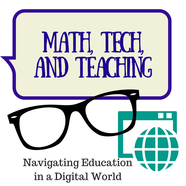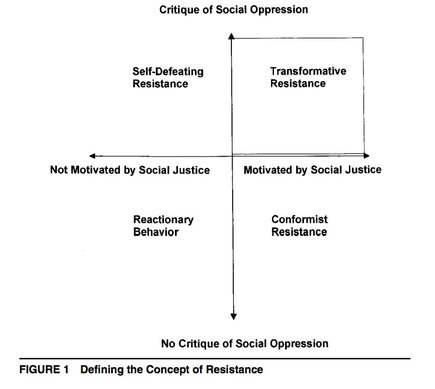 It has been difficult to figure out what my connection to teaching math looks like now that I have taken on a new position that is not in a classroom. I still have a strong love for math and I purposefully have signed up to present AP Calculus Saturday Study Sessions in order to maintain my skills. I am finding that it is just a part of who I am and my position cannot get me to let go of my hold on teaching math. When it came to the Math, Tech and Teaching Podcast, however, I didn't really know what to do. I had received a handful of emails reaching out to me based upon the podcast. Hearing from listeners made me even happier than I had anticipated and I wanted to keep the conversation going. As a result, I have decided to revive my podcast and open up the content to the questions and stories of listeners. I'm curious about where this journey will take me and I hope that some of you will join me. To share a story or ask a question you can contact the show in the following ways.
You can find the latest episode here. You can find also find the podcast and subscribe via iTunes.
I hope to hear from you soon!
0 Comments
It's not often that I find myself at a loss for words at the end of a conference, but I have still struggled to describe what I learned at the School Reform Initiative Winter Meeting earlier this month. I have attended other conferences and felt frustrated that issues of equity and inclusion were brushed over. This conference did no such thing. The entire week was saturated with discussions about equity and inclusion. And while I had many great conversations about equity during the week, I am still left speechless over the closing keynote by Paul Gorski. I know the video is long, but if you're someone who is passionate about equity in education, this may be one of the most powerful hour-long presentations you have ever seen. I hope that you find it as moving as I did. What did you think? Feel free to leave your reflection in the comments below!
Today, I was able to attend a pre-conference session to the School Reform Initiative Conference focused on equity in education. The delightful Amber Kim presented a variety of research, videos and activities designed to push educators from across the country to think more deeply about what equity really means. Additionally, she provided practical, academically grounded approaches that encourage educators to build a system of education that increases academic achievement for students, while equipping them with equity literacy and positive socio-cultural identity. Before even attending the conference, I knew that the session was going to push beyond the typical conversation around equity based upon the thought-provoking article we were asked to read before the session. While it is impossible to capture all of the amazing things shared in today's session, I hope to share some of my major take-aways in this post. One of the things I really appreciated about this session, was the strategic use of videos to illustrate many of the concepts presented. Luckily, Amber has an entire Youtube playlist that has all of the videos from the session and more. My favorite of these videos reminded me of my students. It wasn't until I saw this video that I understood some of the conversations I had with my students around pronouncing their names correctly and they impact it had on our relationship. You can see the video below. The next concept that was particularly helpful was the idea of equipping students with equity literacy. This includes helping students see or recognize bias and inequities, respond to those biases and inequities and redressing the biases and inequities they see. I especially appreciated the way that Amber argued that an equitable education includes not only academic achievement, but must also include both a positive socio-cultural identity and a deep understanding of equity literacy in order to be truly equitable. I believe this is an important distinction that is often overlooked in the eduation world - test scores wrongly tend to be seen as the only measure of success that matters. One of my favorite concepts from the session was the graphical model of the concept of resistance. As a math teacher, it really helped me to visualize the many ways we handle addressing issues of inequity in society and how they can fit on a spectrum. While I would try to describe the graph below, I recommend checking out this site for a brief, clear description of the model. Amber did an excellent job helping us process the model by placing images and scenarios on the graph. She also gave several examples of how teachers can help improve student equity literacy by encouraging them to place historical figures, fictional characters, modern-day celebrities, etc within the model. As I continue to work on the Bias and Equity Training Hybrid Course (mentioned in a previous post), I am sure that I will continue to come back to the many resources presented in today's session. Addressing inequity in our education system and society is incredibly important work that has an increased sense of urgency in today's climate. Our students need us to educate ourselves around issues of inequity and ensure that we do not contribute to an already bias and inequitable system. We cannot sit back and wait for others to move this work forward. In a time where many things are uncertain, we need to be the best advocates possible and serve as a role model to our students. I know I will continue my own personal and professional work around equity and I invite you to do the same. What work are you doing around equity? What resources or tips can you share? Please share any reflections or suggestions in the comments below! While I feel like I am always reflecting, the start of a new year brings the opportunity to look back on 2016. It would be an understatement to say that it has been a big year of change for me - I got a new job, I got married, my name changed and I have wrestled with my identity throughout all of it. While students are still my passion and focus, I have struggled to talk about my work since it no longer revolves around students. As a teacher, I used to come home from work and tell and handful of stories about my day. I now find myself coming home and simply muttering some mono-syllabic response to the question "How was your day?" You may think that this implies that I don't like my new position, but you would be wrong. I love the work that I'm doing now. The difference is that I don't know how to talk about it. I spend a great deal of my day creatively imagining different ways to make sure the professional development can be a joyful, rigorous and personalized experience (a coined phrase the has come up a lot in my new position) instead of a dreaded time-suck. I'm making gamified PD, scheming big-picture plans for online course rollouts, etc. But it's all so new to me that I don't always know how to talk about it. I've learned the math and teacher lingo, the edtech phrases, etc. Now, I don't know what people want to know about my new role. What do I blog about? Tweet? Luckily, I have been given the wonderful opportunity to present AP Calculus Saturday Study Sessions for the Colorado Education Initiative for another year. If you have never heard of them, their work with AP programs absolutely transformed my teaching practice when they supported my school through the Legacy Schools Program. They are incredible people that have done amazing things for students across Colorado. While I wrestle with my professional identity in my new position, I am so happy that they have given my the change to get my fix for geeking out over calculus with students. It's the one thing that feels normal as a recovering AP Calculus teacher. If you have any ideas for what you would like to hear about with my new 'Professional Learning Parner' role, please be sure to message me on Twitter or leave a comment below. Happy New Year everyone!
|
AuthorMattea Garcia is a human-centered problem-solver dedicated to improving learning and technology experiences. This blog is dedicated to reflections on leadership, educational technology, instructional coaching, educational equity, and more. Archives
June 2022
Categories |

 RSS Feed
RSS Feed
